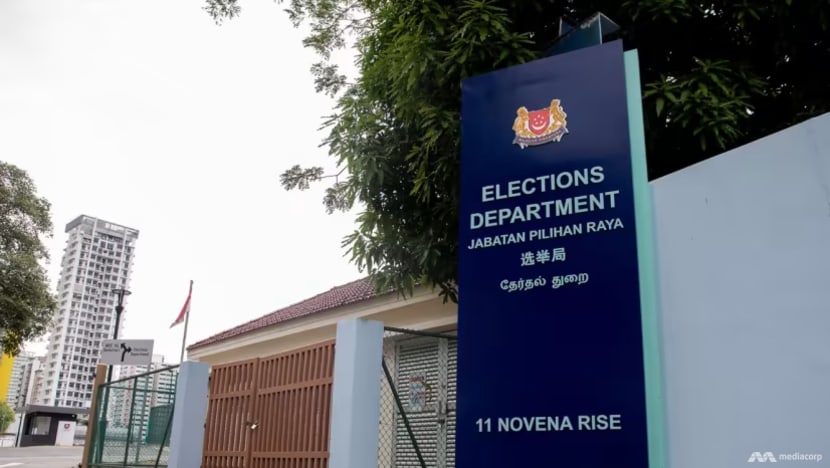Presidential Election candidates urged to guard against foreign interference, cybersecurity threats
Singapore is not immune to foreign interference, which undermines political sovereignty and harms social cohesion, said MHA, CSA and ELD.

Singapore's Elections Department. (File photo: TODAY/Ili Nadhirah Mansor)
SINGAPORE: Government agencies on Tuesday (Aug 15) urged Presidential Election candidates to stay vigilant against potential foreign interference and cybersecurity risks to safeguard the integrity of the election.
Foreign interference include attempts by foreign actors to "manipulate domestic politics through covert and deceptive means”, the Ministry of Home Affairs (MHA), Cyber Security Agency of Singapore (CSA) and the Elections Department (ELD) said in a joint news release.
This undermines political sovereignty and harms social cohesion, they added.
They cited reports of alleged foreign interference in other countries' elections, such as during the 2020 United States Presidential Election and the 2017 French Presidential Election.
“Singapore is not immune,” they said. “Singapore’s politics should be decided by Singaporeans alone. We should do all we can to safeguard the integrity of our electoral processes.”
Information on some methods used by foreign actors to interfere in elections, as well as precautions candidates can take to mitigate the risks of becoming a target of or unwittingly facilitating foreign interference, is available on the Election Department’s website.
Taking steps, such as fact-checking and monitoring their own social media platforms for suspicious or anomalous activity, will help safeguard their campaigns from potential foreign interference threats, the agencies said.
The government will also be on alert for such interference, they said.
A similar advisory was issued ahead of the 2020 General Election.
Additionally, MHA, CSA and ELD warned of cybersecurity risks ahead of the election.
Instances of malicious cyber activity – such as disruption, defacement or data theft – have been reported during elections of other countries, which have affected their electorates’ confidence in the election processes.
Singapore, as a highly digitally connected nation, must guard against attempts to disrupt the election processes or cast doubts on the integrity of the Presidential Election, they added.
Preventive measures to mitigate cybersecurity risks include establishing strict access control and remote access privileges to digital assets, enforcing strong password management and performing regular software updates to protect campaign devices from known vulnerabilities.
Candidates should also raise cyber awareness among campaign staff and develop cybersecurity monitoring and incident response capabilities.
“Presidential Election candidates play an important role in safeguarding the integrity of the election,” MHA, CSA and ELD said.
“They are also advised to stay vigilant by monitoring their platforms for suspicious activity and not re-share posts or tweets of suspicious provenance.”
They urged candidates to make a police report immediately and keep the ELD informed if they detect or suspect foreign interference in the election, or that their accounts or systems have been compromised or misused.
GUIDELINES ON POLITICAL FILMS, ADVERTISING
In a separate news release, ELD and the Infocomm Media Development Authority (IMDA) reminded members of the public on the rules and prohibitions on party political films, online election advertising, election surveys and exit polls.
This includes the prohibition on making, exhibiting or distributing party political films, such as those intended or likely to affect voting in a political election in Singapore.
Individuals who make or publish such films are subject to investigations and prosecution, ELD and IMDA said. However, certain types of films – for example, live recordings of events held in accordance with the law and those made solely for news reporting by a licensed broadcasting service – are exempt.
The agencies also said the publishing of paid online election advertising is reserved for candidates and their election agents, with all paid advertising to be declared to the Returning Officer and abide by the published-by requirements.
“This ensures accountability and prevents the use of paid advertisements as a conduit for foreign interference in the elections process, or to bypass the election expense limits for candidates,” ELD and IMDA said.
Singaporeans will head to the polls to vote for a new president on Sep 1 if more than one candidate qualifies to run for the post.
Four potential candidates - former Senior Minister Tharman Shanmugaratnam, businessman George Goh, former GIC chief investment officer Ng Kok Song and former NTUC Income CEO Tan Kin Lian - have announced their bids.
Nomination Day is set for Aug 22, and a cooling-off period where all campaigning must stop will be observed between the eve of Polling Day and when polls close.


















